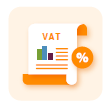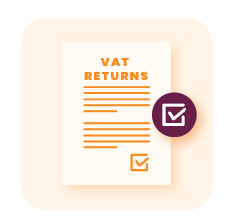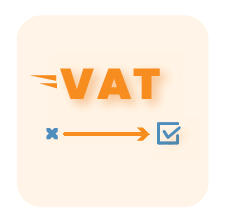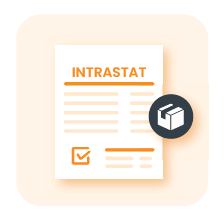Reverse Charge & “Call Off Stock” in Lithuania
The reverse charge mechanism mandates that the recipient of a supply should report the VAT as output tax on its VAT return for the period in which the purchase was made. The recipient can then claim back this VAT as input tax on the same return, provided that they have the right to deduct input VAT in full.
Read more about Reverse Charge and “Call-off stock” in Lithuania in our comprehensive guide below.
Selling in Lithuania?
Lithuania – “Call off stock”
When it comes to consignment stock, the stock is transferred from one location to another by a transferor, also known as a consignor. The consignee then sells the stock to the end client. While the merchandise is in the warehouse, it remains under the custody of the consignor, and ownership usually transfers to the consignee just before the official sale takes place.
According to Article 4(1)(3) of the Lithuanian VAT Law, a foreign consignor who transfers consignment stock to a warehouse in Lithuania is generally required to register for Lithuanian VAT. This is because the transaction is treated as either an import or an intra-Community acquisition by the consignor, depending on whether the goods are transported from outside the EU. The consignee’s withdrawal of the merchandise from the warehouse is considered a domestic supply in Lithuania.
Call-off stock refers to products that a supplier transfers to a warehouse or storage facility where they can be taken by a pre-identified client at any time. Typically, the client is the owner or operator of the warehouse.
Sales of call-off stock that involve the movement of goods into Lithuania generally trigger a registration requirement. However, providers of call-off stock registered in other EU Member States may be eligible for an exemption from registration in Lithuania through a simplification plan, provided certain conditions are met.
Simplifications for Call-Off Stock on or after January 1, 2020 (“Quick Fix”)
As of January 1, 2020, one of the “Quick Fixes” introduced by Article 17a of the EU VAT Directive aimed to standardize and simplify rules across the European Union. These standardized rules have been incorporated into Articles 42 and 51 of the Lithuanian VAT Law, along with their associated requirements.
Once the simplification rule is applied, a supplier has the ability to transfer stock from one EU Member State to a warehouse located in another EU Member State for a subsequent delivery to a known customer, provided certain conditions are met. However, it should be noted that the transfer of ownership of the goods to the recipient in this scenario is considered a taxable event.
It is regarded as an intra-Community supply of goods from the supplier to the recipient and an intra-Community acquisition by the recipient in the Member State of acquisition. Consequently, the supplier is no longer obligated to register for VAT in the destination Member State.
Download the Lithuanian VAT Guide
Lithuania – Import VAT
For VAT purposes, imports into Lithuania are generally subject to taxation.
Liability for Lithuanian VAT is determined by the place of supply of goods or services, rather than the location of the supplier. Therefore, import VAT is typically due on all goods and services acquired from outside the EU, irrespective of whether the buyer is a registered VAT payer.
Import VAT is generally applicable to all purchases of goods and services made from outside the country, regardless of whether the customer is a VAT payer or not. However, there are certain categories of items in Lithuania that qualify for import VAT exemptions or lower rates.
According to Chapter V of the Lithuanian VAT Law, the following imports are exempt from Lithuanian VAT:
- Goods that are either VAT exempt or subject to a zero-rated VAT locally.
- Imports of gold by central banks or the European Central Bank.
- Re-imported goods that meet specific criteria, such as being brought back in the same condition as when they were exported.
- Imported property inherited from a relative.
- Personal belongings brought into the country by students.
- Therapeutic compounds derived from humans.
- Imported goods intended for trade promotion purposes.
- Literature related to tourist information.
In these cases, no Lithuanian VAT is levied on the imported goods or services mentioned.
Import VAT Recovery: VAT payers in Lithuania may recover input VAT on imported goods if they can demonstrate that the goods will be used to generate other taxable supplies of goods or services. Upon importing goods into Lithuania, VAT payers may be eligible for a one-time set-off, meaning they are not required to pay import VAT to the budget, provided they account for the VAT and can provide evidence justifying the deduction.
Low-Value Imports: Similar to import VAT recovery, VAT payers in Lithuania can also benefit from a tax break on low-value imports if they can demonstrate that the goods will be used to create other taxable supplies of goods or services. In this case, they can claim a one-time set-off and are not obligated to pay import VAT to the budget, as long as they account for the VAT and provide supporting evidence for the deduction.
Last Updated: 06/11/2023
Disclaimer
The information provided by Global VAT Compliance B.V. on this webpage is intended for general informational purposes only. Global VAT Compliance B.V. is not responsible for the accuracy of the information on these pages, and cannot be held liable for claims or losses deriving from the use of this information. If you wish to receive VAT related information please contact our experts at support@gvc.tax








